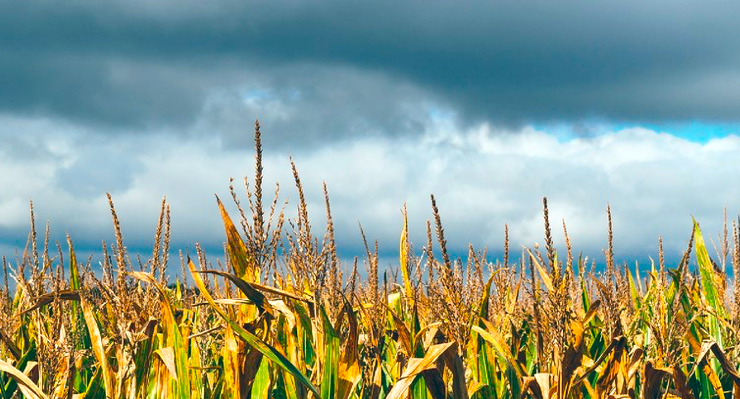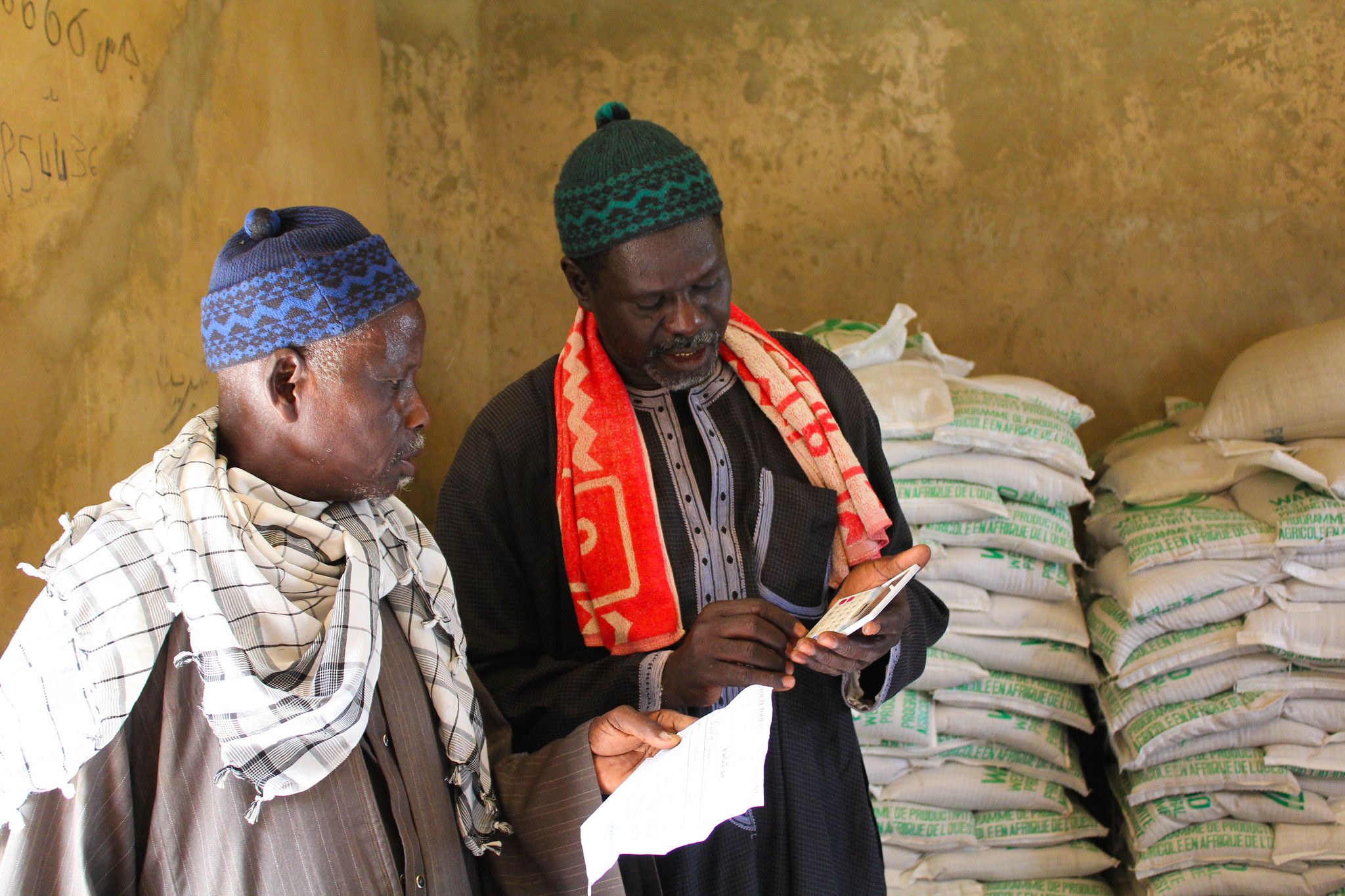Compounded by Ukraine, food prices will continue to climb as the consolidated global agricultural system faces problems it can’t handle, writes Jim Goodman.

(Andrea Seaman, Flickr, CC)
By Jim Goodman
Common Dreams
 Even before the war in Ukraine, the sanctions on Russia, and the shipping blockade of the Black Sea, farmers across the U.S. were getting ready for higher prices on seed, fertilizer, and crop chemicals.
Even before the war in Ukraine, the sanctions on Russia, and the shipping blockade of the Black Sea, farmers across the U.S. were getting ready for higher prices on seed, fertilizer, and crop chemicals.
All winter, major farm media was warning farmers to book supplies early as prices would be high and supplies would be short. The war in Ukraine has only amped up the concern among farmers, input suppliers, and those who erroneously proclaim that we, the U.S., must feed the world.
The farm media offers suggestions as to how farmers, despite relatively higher crop prices, might deal with the even steeper increase in input costs. Use less, get your old tillage equipment out or, heaven forbid, consider manually pulling weeds like farmers used to do — of course, years ago, farmers didn’t run thousands of acres.
While oil companies used the sanctions on Russian oil to steeply ramp up their prices, even though Russian oil continues to flow almost without interruption, corporate agribusiness also has a convenient smokescreen to ramp up input prices even further — nothing short of blatant corporate profiteering.
Despite the war, Ukrainian farmers continue to plant and shift their production to feed Ukrainians locally. But, like Ukraine, farmers all over the world cannot farm if they are under fire, so, acreage planted and tons harvested in 2022 will be down significantly from years past.
With grain and fertilizer tied up by Russian blockades of Black Sea terminals, severe drought and flooding, and aftereffects of the Covid pandemic, food prices will continue to climb as the consolidated global agricultural system is faced with problems they are unable to deal with.
Ignoring its obvious faults and clear failures, the industrial food system is touted as the only way forward. Our consolidated food system is immensely profitable for the multinationals that supply the inputs and for those that buy, process and distribute the crops and livestock into the global supply chain. For the farmers, not so much. They buy at retail, sell at wholesale, all while competing against each other in a rigged marketplace.
Here in the U.S., farmers are told they can and must feed the world by growing more corn, more soy and more livestock in confinement, even if that is not what the world wants or can afford to eat.
Industrial agriculture requires ever larger and more expensive equipment, larger farms, more fragile land put into production and it will continue the trend of depopulating rural America as small farms, rural communities, and local food systems are destroyed by corporate big ag.
Worse in Global South

Farmers in Senegal in 2014 after making a long trek for lower prices at a seed processing cooperative. (Daniella Van Leggelo-Padilla, World Bank, Flickr, CC BY-NC-ND 2.0)
And what of farmers in the rest of the world? In the Global South the situation is ever more dire and more unfair. Farmers are pressured by governments, the World Bank, and philanthropists like Bill Gates to follow the industrial model of the U.S., never mind its failures, never mind its cost.
Efforts like the Alliance for a Green Revolution (AGRA), despite billions of dollars spent and promises to double food production and increase farmer income, have proven to be a failure. Africa does not have better access to food, the farmers are poorer and are being driven off their land, victims of technology, the cost of inputs they cannot afford, and land grabs by foreign governments and corporations.
[Related: COP26: Bill Gates’ Magical Thinking on Agriculture]
Perhaps if African countries were not at the mercy of international lending institutions and their farmers the victims of climate change and agri-colonialism, they might feed themselves?
There will always be food for those with money, energy for those with money, needed vaccines for those with money — the multi-national corporations will see to that, even as they continue to extract profit from countries least able to afford it. U.N. Secretary-General Antonio Guterres likened the ongoing and increasing crisis to “a Sword of Damocles now hanging over the global economy — especially the developing world.”
The failures of the system in the U.S. are easily seen — fragility of the supply chain, the emergence of herbicide-resistant “super weeds,” failure of the “promise” of Genetically Modified crops, loss of farms, unrestrained water use and pollution, staggering farm debt and climate change, driven in part by the agricultural system itself.
We don’t know who really said “insanity is doing the same thing over and over again and expecting different results” but they had a point. We have a high-tech industrial food system that is in crisis and has over and over shown its flaws and failures, yet we carry on in denial.
We throw good money after bad, trying to push the same failing systems on Africa and countries across the Global South. We ignore the fact that efforts, like AGRA, have failed and we refuse to support and fund Agroecological solutions that will work.
Crisis should drive efforts for change. Why do we insist on more of the same?
Jim Goodman is a retired third-generation dairy farmer from Wonewoc, Wisconsin, and the president of the National Family Farm Coalition.
This article is from Common Dreams.
The views expressed are solely those of the author and may or may not reflect those of Consortium News.

The asset management companies and banks will someday own all the farms. There is nothing we can do about it.
I hope family-owned farms in the US see themselves as resistance to a total monopoly on food production and hang on somehow in spite of rising costs.
Yes,the press has been usurped.
Usurp defined>take a position of Power or Importance illegally or by
force.
Truth or Consequences!!!
.
In my opinion, the largest distortion in American agriculture is generating a huge difference between the prices of healthier and less healthy food. Cheep food is a combination of fatty meat and highly processed grains, calories from full grains and vegetables are many times more expensive compared with countries like Poland (where I understand prices posted on the web).
Consider a “crisis cousin” dish from Poland: kasha with cheese, a lot of onion with white cheese and full grain kasha. A bit of garlic etc, you cook kasha, lightly fry onion, add a bit of garlic and crumbled cheese, pour over kasha. The price of kasha is in line with the price of flour, not many times more expensive than in USA (consider barley, buckwheat etc.), similarly the price of onion reflects it low calorie content and thus high yield, so several times less expensive in USA, and similarly with white cheese (should cost half of hard cheese). Compare with an equivalent “crisis cousine” from North America: macaroni and cheese from a box, a fattening goo.
So we have ethanol and very expensive vegetables and quite expensive fruit that could be grown on those acres, perhaps with more work but less of fertilizers. Lower 50% of the population (in income) is steered to unhealthy food, much less vegetable and fruit, very little of whole grains, legumes in the form of refried beans, lots of fatty (thus cheaper meat, processed snacks. the next 40% is steered to unhealthy food by marketing, top 10% pays premium prices and can eat more rationally.
BTW, I do not think that grass and alfalfa would be much more “efficient” than grain for cattle, however, they are probably better for smaller farms with fully local cycle plants to meat, natural fertilizer back to the ground, healthier for cows (evolved to be eaters of green plants) so less antibiotics, less artificial fertilizers etc. Industrial scale seems to achieve lower labor costs, and perhaps lower interest rates for credit.
Simply another failure of the capitalist system, and it will continue until that system is destroyed.
Not a failure, it is a feature. The whole point of capitalist system is to make money for the “capitalist” class. They are very successful at it, humanity be damned.
I agree entirely with the author. We are in an agricultural crisis, and crisis should drive efforts for change. Yet we remain stuck in the same flawed system. Of course, part of this is because the system is very large, and self-reinforcing, and has a lot of inertia: it’s very difficult to redirect a large system, just as it is difficult to change the course of a giant ocean-going ship. I don’t know the solution but I do believe that change will come, and that it will be driven by the crisis. But it seems we will be at the mercy of the crisis to determine the direction of that change.
“The ultimate hidden truth of the world is that it is something we make and could just as easily make differently” – David Graeber
America has never really fed the third world with food but rather the other way around. Your corporations have always sucked the blood out of them,and your war machine does the rest.
It is the same with oil and mineral resources:
Bribe the corrupt governments,extract their country’s wealth and install the IMF/ world bank interests rates that they can never pay back.
To those that decline: change their governments or start wars. The pattern is so clear to see. Russia should introduce their sanctions on the west by banning all oil, gas, natural resources, fertilizers and all agricultural produce, and sell it to the global South. The west can take care of themselves or implode.
Yes . And good luck , Karl .
Of course if the “leaders” of our nations really cared about our security, health and happiness, they would not push us into irrational hatred of a particular group or even a whole country, punish it with 5000 illegal punishments, insist that everyone we regard as a friend or ally follows our lead, then suddenly realize that all this was hurting us too.
The rich countries of the West do not care at all about the poor countries they exploit; nor do they really want a “green future” if it involves making less profit for their businesses. Calling any rival an enemy and threatening sanctions on anyone who resists will lead to more conflict.The revolting sight, not only of death and destruction in Ukraine but the tonnes of weapons being offloaded by the West in the vain pretence that they can defeat Russia militarily while blaming Russia for it all, enables us to see that the Military Industrial Complex, especially in the USA,EU, UK is the only beneficiary and THAT is what leads to the terrible starvation and misery in lands caught in the trap set by the rich.
I realize that I am lucky enough to live in California, where there are lots of smaller farmers whose produce is available at farmers’ markets and other small shops. In San Francisco, produce from local growers is available year round. It is true that some of it costs more, but that is mainly due to the fact that smaller outfits do not produce as much as huge agribusiness farms. And even the produce from agribusiness are more expensive now. People who have back yards might want to consider growing their own to the extent that they can. For those of us who live in apartment buildings, we will continue to go to the farmers’ markets.
Codex alimentarius offers a particularly sinister component to the scaffolding. There is hope in Nicaraguan food sovereignty. India gave us a greatest mobilization in human history of protesting farmers. Altieri and Fukuoka show that scale can be reigned in. There are models out there of permanence and sustained yield. How to get on top of crisis proportions will be the existential test. If we eat the rich it won’t get us very far.
Beef could be produced on one tenth as many acres by feeding alfalfa instead of corn and soybeans. Alfalfa normally requires no chemicals and it grows wherever grass grows.
A local news media projected that soon 90 percent of the population would be urban. That was more than 2 years ago.
There have been zero interviews of farmers explainig how to support ten times the population in cities by the numbers on farms.
Where on the prioority list shall we put gardens and friends?
Extortion in another form??? US…I am sick and tired of your arrogance, of your believe that the planet is yours, that you think you can do with us whatever you please. Charity starts at home…and that should include thoroughly cleaning up your own messy backyard.
‘The failures of the system in the U.S. are easily seen — fragility of the supply chain, the emergence of herbicide-resistant “super weeds,” failure of the “promise” of Genetically Modified crops, loss of farms, unrestrained water use and pollution, staggering farm debt and climate change, driven in part by the agricultural system itself.’
Well, that sounds pretty hopeless. And, by the way the increase in CO2 in the atmosphere is estimated to have increased crop yields by ~ 30%. Aside: The Sahara has shrunk by ~ 8% due to the horrible, bad, terrible introduction of more CO2 into the atmosphere, from its current low point in the entire history of the Earth.
One way we could increase our own food production, is to end the practice of adding corn ethanol to gasoline. This does not save any oil, as it takes as much to grow the corn. 40% of the US corn crop goes to producing ethanol. Think about that.
Bonjour,
La grande différence avec l’agriculture russe est que la Russie ( qui est à 100% autonome alimentairement), a interdit les OGM, (inscrit dans la Constituion russe), alors que tout aux USA est OGM; Nous, en Europe, on n’aime pas les OGM et on se tourne majoritairement vers des produits sains. Nous n’aimons pas la bouffe dégueulasse en provenance des usa, du RU ou du Canada
Insanity is being in a frightening and confusing dream that you can’t wake up from.
It has little or nothing to do with what you are bringing about.
What you’re describing is called “stupidity”.
This article is very good evidence of how it is not just armament manufacturers who benefit from war, but many other corporate-owned industries. It also shows how the corporate-owned mainstream media in not reporting on this is crucial in allowing people in America and elsewhere to be fooled into being willing to work harder, put more of their time on earth, into just earning their daily bread. Governments can only successfully deceive their peoples through the greater evil of the liars in the press. There is an information war going on and so many of the men and women of the press have joined the earlier liars in their ranks and some just keep quiet hugging their false prestige and comfort. Thank you CN for trying to tell the truth!
Yes,the press has been usurped.
Usurp defined>take a position of Power or Importance illegally or by
force.
Truth or Consequences!!!
.